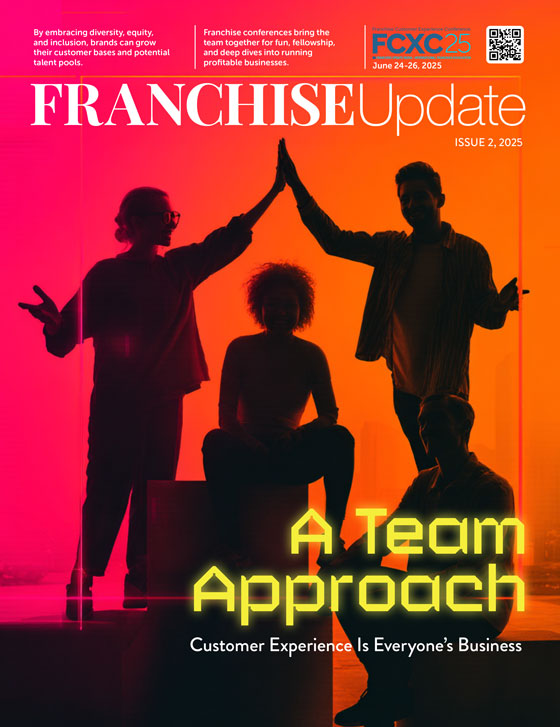Leading with Inclusion: Diversity can still Provide Strategic Advantages

This year, MassageLuXe will reach a milestone in the brand’s 18-year history. The membership-based massage and facial franchise will mark the opening of its 100th location. Only 16% of U.S. franchises can boast such an accomplishment.
Growing consumer demand pushed MassageLuXe to such rarefied heights as did exceptional customer service and a recession-resistant business model, says CEO Kristen Pechacek. But the company was also aided by its determination to create a welcoming environment that celebrates franchisees of all stripes.
Last year, the brand was recognized as one of the top franchises for Diversity, Equity, and Inclusion (DEI) by Entrepreneur Magazine and a top franchise for veterans and women by Franchise Business Review.
DEI is a tricky, ultra-politicized term these days, praised in some corners and vilified in others. Whatever you want to call it, MassageLuXe has created a big tent, welcoming franchise operators of all ages, races, backgrounds, and opinions.“
At MassageLuXe, diversity isn’t just a goal; it’s a strength,” Pechacek says. “With over 60% of our franchisees coming from diverse backgrounds, we are proud to foster an inclusive environment where entrepreneurs from all walks of life can thrive.”
MassageLuXe is excelling at something that, for years, the franchise world has been doing better than the business world as a whole. The numbers vary slightly from report to report, but according to the International Franchise Association (IFA), roughly 26% of franchise businesses are owned by minorities compared to 17% of nonfranchised small businesses.
Moral imperative aside, diversity can provide a strategic advantage to brands as they try to serve their customer bases. When franchisees and brand leaders come from various cultural and socioeconomic backgrounds, franchisors can hone products and marketing campaigns to pull in a wide array of customers.
Pechacek says fresh ideas and new opportunities emerge when people bring different experiences to the table. “Our commitment to diversity, equity, and inclusion drives innovation, enhances customer experience, and strengthens the communities we serve,” Pechacek says.
It also makes it more likely that people from historically underrepresented communities can see themselves as franchise owners.
“The best franchise prospect comes through a referral from a current franchisee,” she says. “So, the more diverse and collaborative you can make your franchise, the higher chance you have of growth.”
It’s no wonder that franchising is leading the way when it comes to opening up opportunities for business ownership to women and minorities.
“Franchising, by nature, allows people to become a business owner in a less scary and more supportive way than going out all by yourself and doing it on your own,” says Kristin Kidd, chief operations officer for Head to Toe Brands, which has a portfolio of more than 200 locations of The Lash Lounge, Bishops Cuts/Color and Frenchies Modern Nail Care.
“And that’s attractive to any type of human,” Kidd continues. “It does not matter your age, your race, your identity, your gender, your religion, any of it. It’s attractive to be able to start your own business and take your future into your own hands and do something with the support system. That’s what franchising does.”
In addition, more diversity in ownership can increase customer loyalty, Kidd says.
“In the beauty industry, our clients are diverse,” she says. “If we only had one viewpoint and one kind of person owning our businesses or one kind of person on our corporate team, then we would be missing out on other perspectives.” Different viewpoints are not just important in the ownership ranks. They’re important on the corporate level, says Kidd, who is also a franchisee with School of Rock.
“Honestly, what makes us great leaders and what we really work toward is empathy. On our leadership teams, many of us are franchisees or at least small business owners. I think that’s pretty uncommon in franchise leadership. Not everyone has the time or energy to also own their own business. But it’s really important that we are able to speak to our franchisees with that empathy and sympathy. The same thing happens when you have diverse backgrounds on your leadership team.”
Through the decades
The concept of diversity, equity, and inclusion isn’t new. Diversity training began cropping up in workplaces three decades ago.
Stephen Covey is the author of The 7 Habits of Highly Effective People, a book first published in 1989 and named as one of the 25 most influential business management books by Time magazine in 2011. He promoted diversity as a goal, saying, “Strength lies in differences, not similarities.”
The notion that DEI needs to be a conscious, sustained effort has been widely embraced in the business world. Eight years ago, a coalition of executives from several big companies launched the CEO Action for Diversity & Inclusion initiative. It’s now led by the Society for Human Resource Management (SHRM).
The initiative’s stated goal is “advancing inclusion for all employees and making them feel supported in the workplace, regardless of race, ethnicity, national origin, gender or gender identity, sexual orientation, age, religion, disability status, veteran status, or other aspect of diversity.”
Some 2,500 business executives took the CEO Action’s pledge to support and promote more inclusive workplaces. Social movements, such as #MeToo and #BlackLivesMatter, pushed corporations to do even more to bring about inclusive workplaces.
Pushback
Not everyone is on board. Critics see many of the initiatives as discriminatory and suggest a perceived favoritism. Recently, the backlash has grown exponentially, and politicians are taking up the cause of those who argue that DEI initiatives have led to reverse discrimination.
In today’s polarized U.S., many companies are now shying away from talking as much about diversity and inclusion as they did in the past. Company and government web pages that once proudly announced commitments to DEI goals are disappearing.
Those retreats haven’t gone unnoticed. DEI advocates have fired back, launching boycotts against several big companies, including Target, Best Buy, and McDonald’s. While the effectiveness of boycotts is being debated, market researchers say it’s too soon to say if there will be an impact on customer loyalty and brand perception.
Viewpoints
The controversy won’t be resolved soon. Still, many franchise executives say diversity makes good business sense.
“We want diverse ideas and backgrounds in order to make our business stronger across the franchise,” Pechacek says. “It’s incredibly important to me that we are providing anybody and everybody with the opportunity to not only own a spot, but also the opportunity to receive services at MassageLuXe and to improve their health and wellness.”
To appeal to a broad spectrum of people, franchisors must listen to a broad spectrum of voices from a variety of backgrounds, Kidd says.
“If you’re in your own echo chamber as a leader, you’re not going to really understand what needs to happen at the franchisee level to help them grow,” she says. “If everyone is always just telling you, ‘Wow, that’s a great idea,’ that’s just a recipe for failure.”
In its The Value of Franchising report, the IFA said that a third of its survey respondents stated they would not own a business without the support that the franchise model provides. Women and first-time owners, in particular, were likely to respond that way.
“By allowing people to go into business for themselves, but not by themselves, franchising opens the door to entrepreneurship at higher rates than other business models, especially to those from underrepresented communities,” says David Smith, IFA’s director of diversity programs. “We’re proud of franchising’s role in expanding economic opportunities and upward mobility to people from all walks of life and will continue educating the public about this proven model of achieving the American dream. IFA’s role of breaking down barriers and lifting more people up is a major component of our mission to strengthen the franchise model for generations to come.”
How to Embed DEI into Your Franchise Strategy
Diversity, equity, and inclusion (DEI) efforts at any franchise brand should begin at the top. Leadership should actively champion the DEI initiatives that are important to your brand. Set clear goals, allocate necessary resources, and hold the organization accountable for progress. When leaders demonstrate a commitment to DEI goals, it sets the tone for the entire organization. Consider the following steps:
- Implement inclusive onboarding practices: widen the talent pool
- Review and improve hiring and onboarding processes for inclusivity and equity.
- Expand recruitment efforts to reach underrepresented groups.
- Partner with organizations to broaden outreach or consult experts to audit and enhance interview and onboarding practices.
- Foster an inclusive culture: encourage open dialogue
- Create spaces for open, honest conversations about DEI.
- Encourage team members to share their experiences and perspectives.
- Proactively address any issues that arise.
- Provide training and workshops to build awareness and understanding across the organization.
- Measure and report: track progress and celebrate wins
- Track progress against DEI goals and be transparent about results.
- Celebrate successes and acknowledge areas needing improvement.
- Be transparent to help build trust and reinforce the importance of DEI.
- Diversity doesn’t have to be a bad word
- Embrace diversity as a valuable part of today’s franchise landscape.
- Engaging honestly, openly, and transparently about DEI can unlock innovation, build stronger connections with customers, and create a more resilient and engaged franchise system.
IFA initiatives serve the underserved
In 2024, the IFA created the Franchise Ascension Initiative to provide business ownership opportunities in underserved communities throughout the country.
The six-month Franchise Ascension Initiative accelerator program equips individuals from underrepresented and economically disadvantaged backgrounds with the education, mentorship, resources, and support needed to successfully become franchise owners. These ownership opportunities impact the franchisees, their employees, and the communities they serve.
Likewise, through its programs and events, IFA’s Diversity Institute fosters diversity and inclusion within the franchising community by raising awareness of the franchise business model and creating opportunities for individuals from underrepresented backgrounds. The programs and events are designed to:
- Offer franchise ownership training tailored for diverse populations
- Create an accessible platform for individuals to discover franchise opportunities with companies actively seeking multicultural franchisees
- Support IFA member companies in enhancing their multicultural marketing strategies across all organizational levels
Franchising can serve as a crucial gateway for economically disadvantaged groups who have historically encountered significant barriers in accessing essential resources, such as capital, fair and sustainable financing, property ownership, and insurance, thereby offering a pathway to economic empowerment.
The franchise model uniquely enables individuals from all backgrounds, regardless of prior experience or educational attainment, to realize the dream of business ownership while mitigating the substantial risks associated with launching a completely new venture. This accessibility can help enable wealth accumulation opportunities and foster the creation of jobs that provide not only employment, but also clear avenues for career advancement and long-term economic stability within communities.
Ongoing demographic shifts and substantial population growth present a distinct and timely opportunity for franchise brands to strategically engage with and cultivate previously untapped talent pools within communities that were once underrepresented.
You can learn more about these programs and activities at franchise.org.
Share this Feature
Recommended Reading:
| ADVERTISE | SPONSORED CONTENT |
FRANCHISE TOPICS
- Multi-Unit Franchising
- Get Started in Franchising
- Franchise Growth
- Franchise Operations
- Open New Units
- Franchise Leadership
- Franchise Marketing
- Technology
- Franchise Law
- Franchise Awards
- Franchise Rankings
- Franchise Trends
- Franchise Development
- Featured Franchise Stories
FEATURED IN

Franchise Update Magazine: Issue 2, 2025
| ADVERTISE | SPONSORED CONTENT |








 The franchise listed above are not related to or endorsed by Franchise Update or Franchise Update Media Group. We are not engaged in, supporting, or endorsing any specific franchise, business opportunity, company or individual. No statement in this site is to be construed as a recommendation. We encourage prospective franchise buyers to perform extensive due diligence when considering a franchise opportunity.
The franchise listed above are not related to or endorsed by Franchise Update or Franchise Update Media Group. We are not engaged in, supporting, or endorsing any specific franchise, business opportunity, company or individual. No statement in this site is to be construed as a recommendation. We encourage prospective franchise buyers to perform extensive due diligence when considering a franchise opportunity.